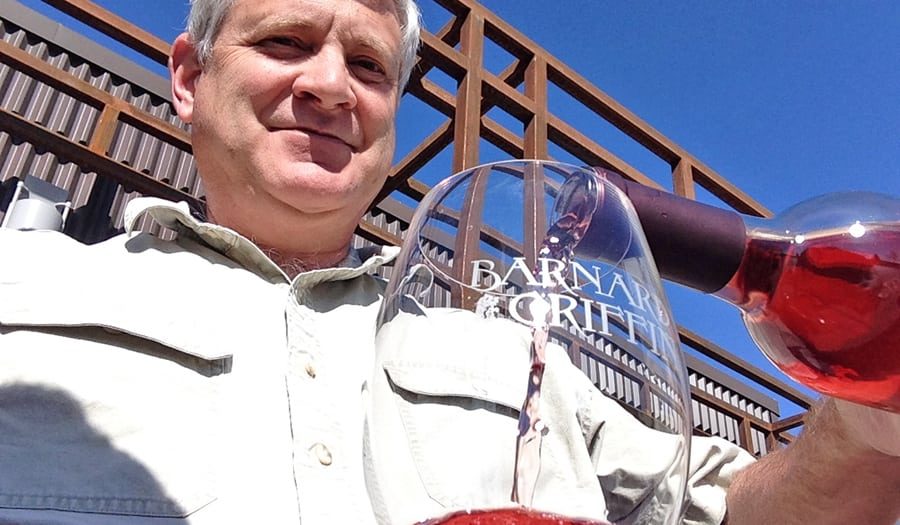
Home » Richland winery making one of best rosés in country
Richland winery making one of best rosés in country

February 14, 2018
By Andy Perdue and Eric Degerman, Wine News Service
When Rob Griffin arrived in Washington wine country from his native California in early 1977, he never dreamed he’d be most famous for making pink wine.
Yet today, the owner/winemaker of Barnard Griffin in Richland may be making the best rosé in America. Among wine lovers, Griffin is known for producing top Cabernet Sauvignon, Merlot and Syrahs, always priced under $20, so delicious wines and reasonable prices have been his foundation for building a top multi-generational family-owned winery.
In what can only be considered a rite of spring, Barnard Griffin’s latest rosé — the 2017 vintage — won the sweepstakes award in January for best rosé in the San Francisco Chronicle Wine Competition, held each winter in the Sonoma County town of Cloverdale. The judging this year drew nearly 7,000 entries, making it the largest judging held in North America.
This is nothing new for Griffin, who has won the rosé category five times since 2008, and a gold medal every year there for 12 out of 13 years. With the top judges in California, Griffin has solidified his position as the best rosé producer in America.
“I’ve always liked it,” said Mike Dunne, a wine writer for the Sacramento Bee, who is considered one of the top wine judges in the country. “I like how forward it is — vibrant. I think that’s Sangiovese. I’m surprised more wineries don’t exploit Sangiovese in that way. Two of those three rosés in the (Chronicle) sweepstakes were Sangiovese.”
As with any wine, it starts with the grapes. Sangiovese is most famous in its native Italy, where it goes into the internationally famous Chianti wines of Tuscany.
Griffin doesn’t have a fondness for the variety and said he would not make a red table wine with the variety, but thought several years ago that the variety’s trademark bright acidity and red fruit aromas and flavors might be perfect for a summer wine like rosé.
He first started bringing in grapes from longtime friend Maury Balcom, who has a vineyard north of Pasco. Griffin and Balcom spent years figuring out what the crop load would be to provide the balance of fruit and acidity in the wine.
After several years of trials, they have settled on about nine tons an acre, an amount that is roughly five times as much as a winemaker would seek for a typical table wine.
Griffin is almost embarrassed by this statistic, but points out that the vine naturally wants to carry this level of crop.
Sangiovese produces large, heavy clusters that result in a lot of wine — one reason it’s a favorite in Italy. It’s also better for the farmer, who generally gets paid by the ton.
The wine, which retails for $14 and is released each year on Valentine’s Day, resonates with wine lovers, who seem to lap it all up by the beginning of autumn, when the last case goes out the door.
Griffin’s success can be traced to his thoughtful process, as most winemakers produce pink wine as an afterthought, rather than deliberately from vineyard to tasting room. Rosé is one of the hottest categories in America, with more than a hundred Northwest wineries making pink wine. Last year, Rosé shipments increased 58 percent.
Since 2000, direct-to-consumer shipments have risen 200 percent, according to Sovos, an East Coast wine compliance firm.
The biggest competitor in the space is France, which produces a lot of rosé from the Provence, Loire and Languedoc-Roussillon regions. One Manhattan wine shop reports that it sells 700 cases of rosé each year.
Rosé is good business, too. It’s the first wine made each fall, is not aged in oak or steel tanks, is bottled in spring and released to the public, which consumes it young, when it is fresh and vibrant.
Because it spends little time in the winery it means good cash flow for the winery.
The latest vintage is one of Griffin’s largest. At 17,000 cases, it’s his largest-production wine, and he takes it seriously. His daughter, Megan Hughes, focuses on white wines, and his longtime assistant winemaker Mickey French makes the reds.
“That leaves me with the rosé, and I love it,” Griffin said. “We share the responsibility on everything, but I take the rosé very seriously.”
Other wineries around the state have followed Griffin’s lead, making their versions of Sangiovese rosé, and winning awards.
But Griffin has his style dialed in, and it is a longtime favorite with professionals as well as statewide consumers.
Andy Perdue and Eric Degerman run Great Northwest Wine, an award-winning media company. Learn more about wine at greatnorthwestwine.com.
Local News Viticulture
KEYWORDS february 2018





